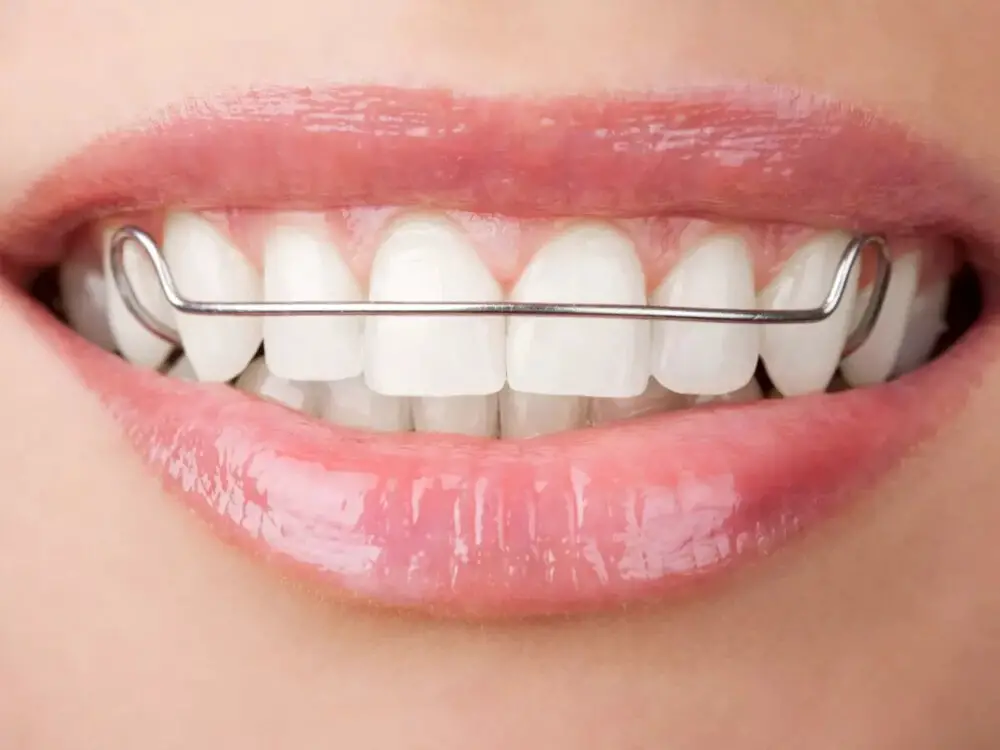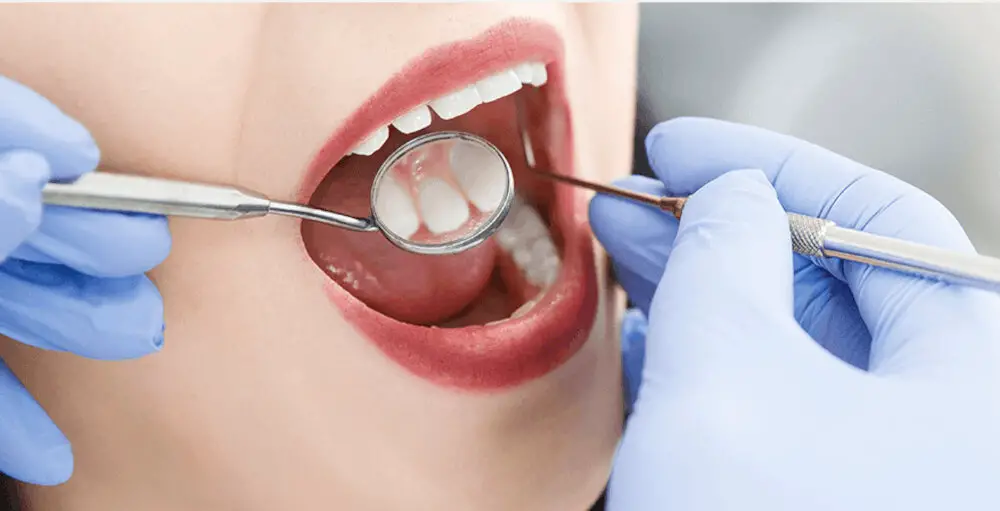When Do Wisdom Teeth Stitches Dissolve: A Comprehensive Guide

Wisdom teeth, also known as third molars, are the last set of teeth to emerge in the mouth, often causing discomfort and pain. After an extraction procedure, many patients are left wondering when their stitches will dissolve. Stitches are commonly used to close the surgical site and promote healing, but the length of time they take to dissolve can vary. Understanding when wisdom teeth stitches dissolve is crucial for proper post-operative care and to avoid any complications. The dissolving time of wisdom teeth stitches depends on the type of stitches used, the patient’s healing process, and their oral hygiene habits. In general, dissolvable stitches take around one to two weeks to dissolve, while non-dissolvable stitches need to be removed by a dentist or oral surgeon. Additionally, the location of the extraction site can also impact the dissolving time of stitches. Patients who are well-informed on this topic can ensure that they are following the correct post-operative instructions and can avoid any unnecessary discomfort or complications. In this comprehensive guide, we will explore the factors that influence the dissolving time of wisdom teeth stitches and provide tips for proper post-operative care.
Wisdom teeth are the third set of molars that typically emerge between the ages of 17 and 25. While they can be beneficial for some people, they often cause issues such as pain, swelling, and infection. When wisdom teeth are extracted, stitches may be necessary to promote healing and prevent complications. Stitches are typically used to close the wound and control bleeding. Dissolvable stitches are commonly used, as they break down on their own and eliminate the need for removal. However, non-dissolvable stitches may be used for more complex extractions or if the wound requires additional support. Proper care and monitoring are crucial after wisdom teeth extraction to ensure a smooth recovery.
The article titled \When Do Wisdom Teeth Stitches Dissolve: A Comprehensive Guide\ provides an in-depth overview of wisdom teeth stitches, their purpose, and the timeline for their dissolution. The article highlights the importance of stitches after a wisdom tooth extraction in preventing bleeding and promoting faster healing of the wound. It also explains the different types of stitches used during the procedure, including dissolvable and non-dissolvable stitches, and the time it takes for the body to dissolve them naturally. The article also offers insights into the aftercare process and provides guidelines on what to expect during the healing process. Overall, the article provides a comprehensive guide to wisdom teeth stitches, ensuring that readers are well-informed on the subject.
What are Wisdom Teeth Stitches?

Wisdom teeth stitches are sutures that are used to close the incisions made during the extraction of wisdom teeth. These stitches are necessary to promote healing and prevent infection. The procedure of wisdom teeth extraction is a common dental surgery that involves making an incision in the gums to remove the impacted wisdom teeth. After the removal of wisdom teeth, the dentist will place stitches to close the incision site to promote the healing process. These stitches play a crucial role in reducing the risk of complications such as excessive bleeding and infection. There are different types of wisdom teeth stitches, and the type used will depend on the patient’s oral health condition, the complexity of the extraction procedure, and the dentist’s preference. The process of wisdom teeth stitches dissolving is a critical aspect of the healing process after wisdom teeth extraction. Dissolvable stitches are commonly used as they eliminate the need for a second visit to the dentist for the removal of the stitches. These stitches are made from materials that dissolve in the mouth, such as gut sutures or synthetic absorbable sutures. Dissolvable stitches can take anywhere from one to two weeks to dissolve, depending on the material used. During this period, patients should avoid touching the stitches or pulling at them, as this can slow down the healing process and lead to infection. Patients should also maintain good oral hygiene practices to prevent infection and promote healing.
Wisdom teeth stitches refer to the sutures that are used to close the incisions made during wisdom teeth extraction surgery. These stitches serve to prevent excessive bleeding, promote healing, and reduce the risk of infection. They are typically made of dissolvable materials that break down over time and do not require removal by the dentist or surgeon. The length of time it takes for wisdom teeth stitches to dissolve varies depending on the type of material used and the individual’s healing process. While some stitches may dissolve within a few days, others may take up to two weeks to dissolve completely. It is important to follow proper aftercare instructions and maintain good oral hygiene to ensure proper healing and avoid complications.
Wisdom teeth stitches are a crucial part of the post-operative process after wisdom teeth extraction. The purpose of these stitches is to close the wound and promote healing while reducing the risk of infection. They also help to control bleeding and minimize discomfort. The type and amount of stitches required depend on the extent of the extraction and the patient’s individual needs. Dissolvable stitches are commonly used as they eliminate the need for removal and dissolve on their own within a few days. With proper care and attention, patients can expect their stitches to dissolve and the healing process to progress smoothly, leading to a full recovery.
After the extraction of wisdom teeth, stitches are often used to close the wound and promote healing. There are two main types of wisdom teeth stitches: dissolvable and non-dissolvable. Dissolvable stitches are made of materials that break down naturally in the body over time and do not require removal. Non-dissolvable stitches, on the other hand, must be removed by a dental professional after the wound has healed. The type of stitch used will depend on the dentist’s preference, the location of the extraction, and the patient’s individual needs. Dissolvable stitches are often preferred for wisdom teeth extractions because they eliminate the need for a follow-up appointment to remove the stitches and reduce the risk of infection.
How Long Do Wisdom Teeth Stitches Last?

Wisdom teeth extraction is a common dental procedure that requires stitches to close the wound after the operation. The stitches are used to control bleeding and to promote faster healing. The length of time that wisdom teeth stitches last depends on the type of stitches used and the healing process of the individual. There are two types of stitches used in this procedure; dissolvable stitches and non-dissolvable stitches. Dissolvable stitches are made of natural materials and dissolve on their own over time. Non-dissolvable stitches are made of synthetic materials and require removal by a dentist or oral surgeon. Dissolvable stitches usually last between 5-10 days and do not require removal. These stitches slowly dissolve and are absorbed by the body, leaving no residue behind. However, non-dissolvable stitches may last for up to two weeks and require removal by a dental professional. During the healing process, it is important to maintain good oral hygiene to prevent infections and complications. Patients should avoid touching the stitches or playing with them as this can cause irritation and delay the healing process. Following the dentist’s instructions and attending follow-up appointments are also important steps in ensuring proper healing after wisdom teeth extraction.
Wisdom teeth stitches are dissolvable stitches that are used to close the gum tissue after wisdom teeth extraction surgery. The typical duration of wisdom teeth stitches can vary depending on the type of stitches used and the individual’s healing process. Generally, dissolvable stitches take around two weeks to dissolve completely, while non-dissolvable stitches may require a follow-up appointment to remove them. During the healing process, it is essential to follow the dentist’s instructions to prevent any complications, such as infection or bleeding. It is also essential to avoid consuming any hard, crunchy, or sticky foods that can irritate the stitches and slow down the healing process. Overall, the duration of wisdom teeth stitches is crucial to ensure proper healing and prevent any potential complications.
The longevity of stitches can be influenced by several factors. Firstly, the type of suture material used can impact the duration of the stitches. For example, absorbable sutures dissolve on their own, typically within 7-14 days, while non-absorbable sutures may need to be removed by a dental professional. Additionally, the location and severity of the wound can affect the lifespan of the stitches. Areas of the mouth that experience more movement or pressure, such as those near the wisdom teeth, may cause the stitches to break down more quickly. Proper aftercare, including avoiding hard foods and maintaining good oral hygiene, can also play a role in the longevity of stitches.
As your wisdom teeth extractions are healing, you may be wondering how long it will take for your stitches to dissolve. Dissolvable stitches are made of materials that break down over time and are often used after dental surgeries like wisdom teeth removal. Signs that your stitches have dissolved can include a decrease in swelling and pain, the absence of visible stitches in the extraction site, and the presence of a smooth, healed gumline. It’s important to follow your dentist’s post-operative instructions and attend follow-up appointments to ensure that your extraction site is healing properly. If you experience persistent pain, bleeding, or swelling, contact your dentist immediately.
How to Care for Wisdom Teeth Stitches

After wisdom teeth extraction, it is common for your dentist to place stitches to help with the healing process. It is crucial to care for these stitches properly to prevent any complications that may arise. Firstly, avoid touching the stitches with your tongue or fingers as this can disturb the healing process. Refrain from eating or drinking for at least an hour after the surgery and avoid hot or spicy foods for the first few days. Instead, opt for soft and cool foods like yogurt or ice cream to prevent any irritation to the wound. Additionally, it is essential to maintain good oral hygiene during this time. Gently rinse your mouth with warm salt water several times a day to keep the area clean. However, avoid using mouthwash for the first 24 hours after the surgery as it may cause irritation to the wound. Do not brush the area for the first few days, but continue to brush your other teeth as usual. If you experience any bleeding, apply gentle pressure to the area with a gauze pad for 20-30 minutes. In case of severe pain or swelling, consult your dentist immediately. With proper care, your wisdom teeth stitches should dissolve within a few days, and you can resume your normal activities without any complications.
Proper aftercare for wisdom teeth stitches is essential to promote healing, prevent infection and reduce discomfort. After the surgery, patients should take it easy for at least a day, avoiding any vigorous activities that may strain the surgical area. Patients should also avoid drinking through a straw, smoking or spitting, as these activities can dislodge the blood clot and cause a dry socket. Instead, they should rinse their mouth gently with salt water solution to keep the area clean and promote healing. Applying ice packs to the affected area can also help alleviate swelling and discomfort. Patients should eat soft foods and avoid hard or crunchy foods that may irritate the surgical area. Following these aftercare tips can help ensure a smooth and comfortable recovery from wisdom teeth surgery.
After wisdom teeth extraction, it is crucial to keep the stitches clean and healthy to prevent infection and promote healing. Firstly, avoid vigorously brushing or rinsing your mouth for the first 24 hours to prevent dislodging the stitches. Instead, rinse your mouth gently with warm salt water several times a day to keep the area clean. Additionally, avoid smoking or using straws as the suction can also dislodge the stitches and delay healing. Finally, maintain good oral hygiene by brushing your teeth twice a day and flossing gently around the stitches to prevent food particles from getting trapped, which can lead to infection. By following these instructions and tips, you can ensure that your stitches dissolve on time and that you have a smooth and healthy recovery from wisdom teeth extraction.
If you experience pain or notice signs of infection around your wisdom teeth stitches, it is crucial to seek medical attention immediately. Signs of infection may include redness, swelling, pus, or a foul odor. In the meantime, you can take over-the-counter pain relievers and gently rinse your mouth with warm saline water to alleviate discomfort. Avoid touching or picking at the stitches, and stick to soft foods that are easy to chew. Keeping the surgical site clean and following your dentist’s post-operative instructions is essential for proper healing and to prevent further complications.
When to Contact Your Dentist

Taking care of your dental health is essential to maintain a healthy and happy life. Regular dental check-ups and cleanings are necessary to keep your teeth and gums in good shape. However, there are times when you may need to contact your dentist immediately. If you experience severe pain, swelling, bleeding, or any other unusual symptoms, you should not delay seeking dental care. These symptoms may indicate a serious dental problem that needs immediate attention. Ignoring these symptoms can lead to further complications and may even require invasive treatments. You should also contact your dentist if you notice any changes in your teeth or gums, such as discoloration, sensitivity, or loose teeth. These changes may indicate underlying dental issues that need to be addressed promptly. Your dentist will be able to diagnose the problem and recommend the appropriate treatment to ensure that your teeth and gums stay healthy. Remember, prevention is always better than cure, so it’s essential to maintain good oral hygiene and visit your dentist regularly to prevent dental problems from occurring in the first place.
After the extraction of wisdom teeth, stitches are usually placed to promote healing and prevent bleeding. However, if the stitches do not dissolve properly or become loose, it can lead to complications. Some signs that indicate a problem with wisdom teeth stitches include bleeding, swelling, pain, and a foul taste or odor in the mouth. In some cases, the stitches may even come out completely. If you experience any of these symptoms after the extraction of your wisdom teeth, it is important to contact your oral surgeon or dentist immediately to prevent further complications and promote proper healing.
It is important to seek professional help after wisdom teeth extraction if you experience any severe or persistent symptoms. These symptoms may include excessive bleeding, severe pain, fever, or swelling that does not improve within a few days. Additionally, if you develop any signs of infection, such as pus or a foul odor coming from the extraction site, it is important to seek immediate medical attention. In some cases, the stitches used to close the wound after extraction may not dissolve on their own, which can cause discomfort and delay the healing process. If you have any concerns about your recovery or the stitches, it is important to consult your dentist or oral surgeon for guidance and advice.
During a follow-up appointment with your dentist after wisdom teeth extraction, you can expect a thorough examination of your mouth to ensure proper healing. The dentist will check the extraction sites for any signs of infection or complications. They may also remove any remaining stitches if they haven’t already dissolved. The dentist will give you instructions on how to properly care for your mouth and any necessary medications may be prescribed. It’s important to attend follow-up appointments to ensure a smooth and successful recovery.
Wisdom teeth stitches play a crucial role in the healing process after wisdom teeth extraction. They are typically used to close the wounds and prevent bleeding. The dissolving process of these stitches varies from person to person and can take anywhere from a few days to a few weeks. It is important to follow the aftercare instructions provided by the dentist, which may include avoiding certain types of foods, smoking, and drinking through a straw. Keeping the mouth clean and rinsing with salt water can also aid in the healing process. If stitches do not dissolve on their own, it is important to contact the dentist to have them removed to prevent any potential complications. Overall, proper care and attention to the healing process can lead to a successful recovery after wisdom teeth extraction.
If you’re about to undergo wisdom teeth extraction, it’s normal to feel anxious or nervous. However, it’s important to remember that the procedure is routine and typically straightforward. After the surgery, it’s crucial to follow your dentist’s instructions carefully and take any prescribed pain medication as directed. Stick to a soft food diet for a few days and avoid smoking or using straws, as these can hinder the healing process. It’s also essential to keep the extraction site clean by gently rinsing with salt water. As for the stitches, they will usually dissolve on their own within a week or two. In the meantime, be patient and allow your body time to heal. Remember, if you experience any unusual symptoms or complications, don’t hesitate to contact your dentist for further guidance.
Conclusion

In conclusion, the dissolving of wisdom teeth stitches is a natural and vital process that aids in the healing of the surgical site. It is important to follow all post-operative instructions provided by your dentist or oral surgeon to ensure proper healing and minimize the risk of complications. While the duration of dissolving stitches may vary depending on the type of sutures used and individual healing factors, it is generally expected that they will dissolve within 7-10 days. However, it is always best to consult with your dentist or oral surgeon if you have any concerns or questions regarding the healing process. Overall, patience and proper care are crucial for a successful recovery after wisdom teeth extraction.






